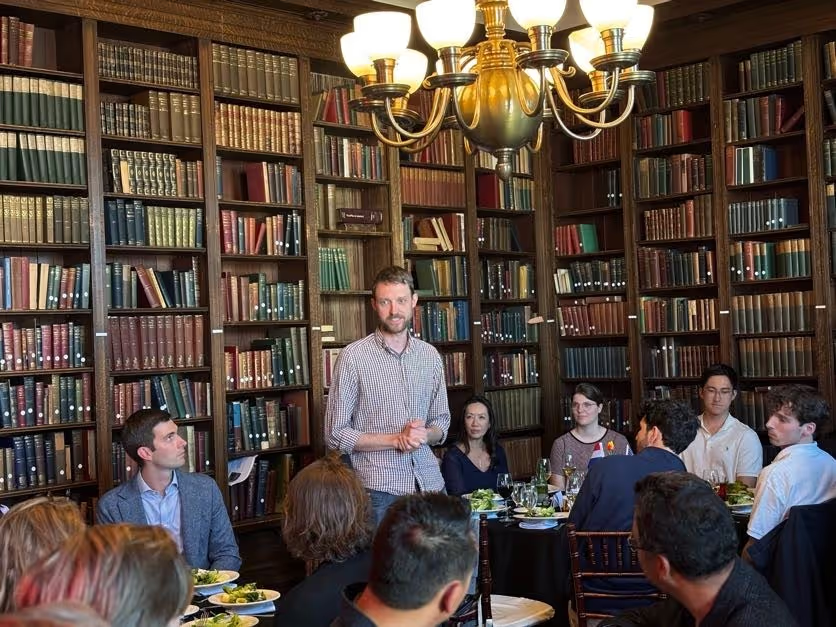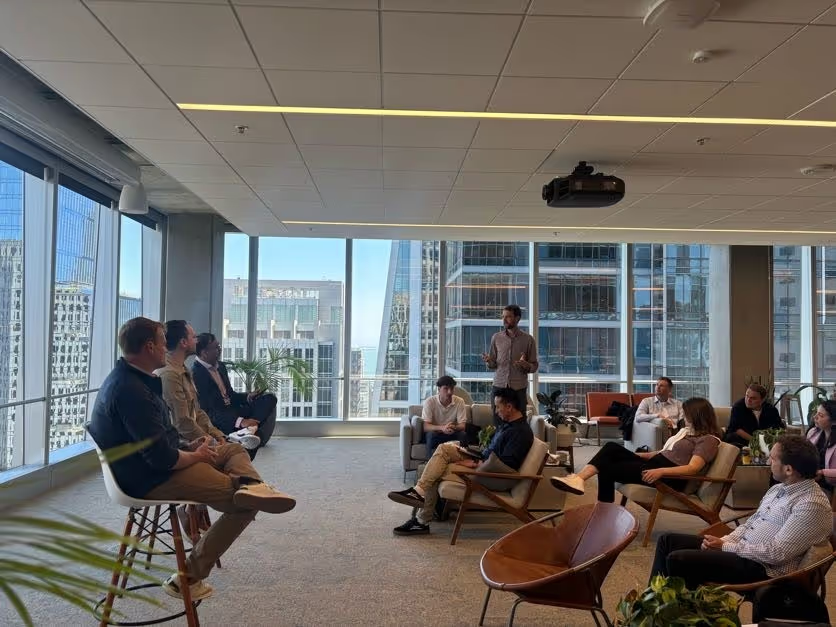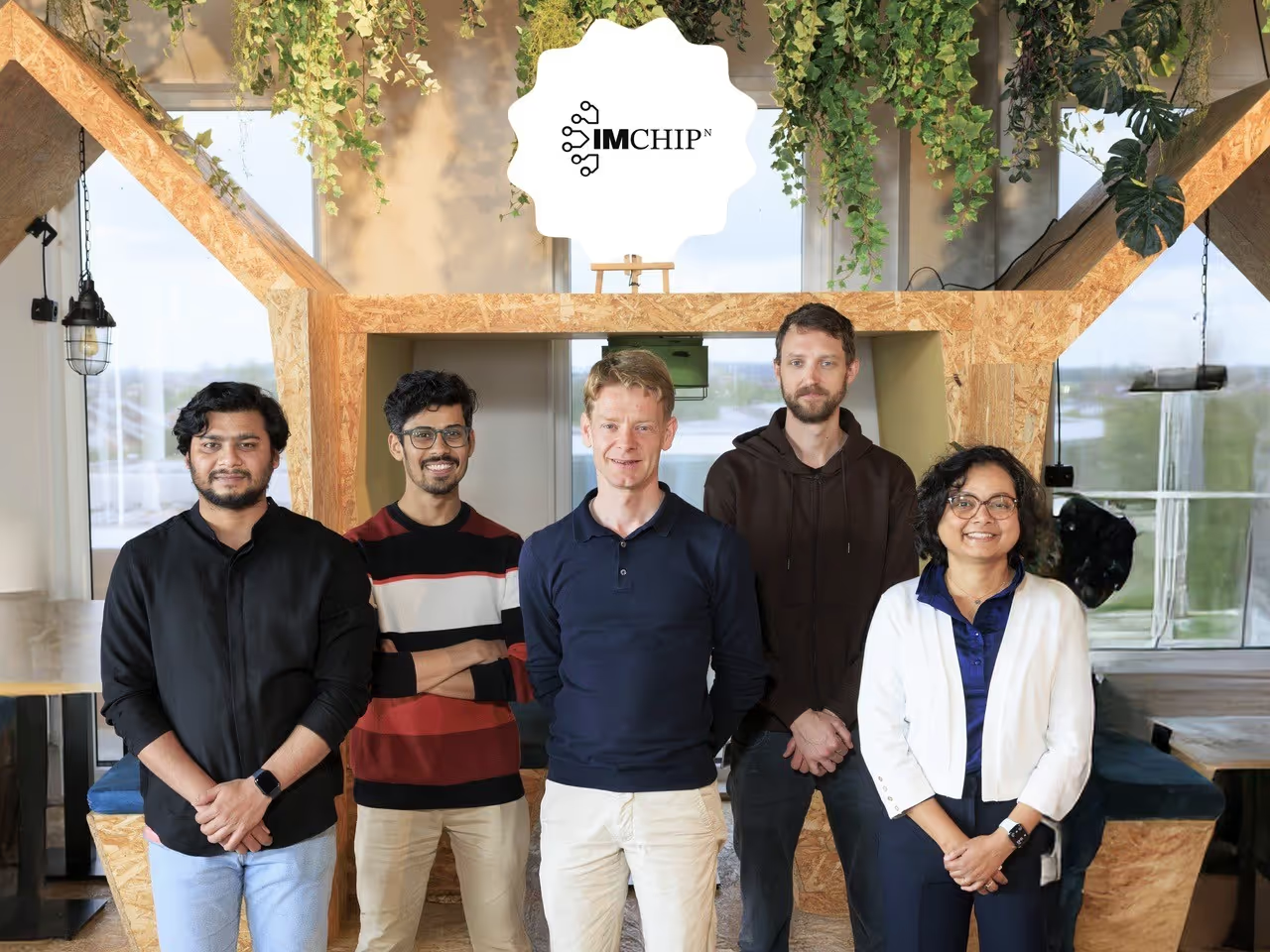Why Ruben Hamming-Green wants to revolutionize AI chips from the north with ImChip

ImChip
I'm alive for a reason.
Says Ruben Hamming-Green about his departure from America ten years ago. Now he returned to his native country as an entrepreneur. Not to stay, but to learn. The American who made the Netherlands his home is developing with ImChip energy-efficient AI chips that could change the fundamentals of computer technology. “AI will be the world's fourth largest economy regarding energy consumption.”
Against the grain
Ruben's story starts differently than most entrepreneurs. Ten years ago, he made the switch from America to the Netherlands. Against the grain. “The scale here is just so different than in the US. Over there, the same amount of people would be spread out over an area where it would take an hour to drive across town.”
That choice for the Netherlands was a conscious one. Where many European entrepreneurs dream of Silicon Valley, Ruben was just looking for the peace of the Dutch system. “In the Netherlands, people are a bit more reserved. It feels like less of a big social club.” That sobriety appealed to him after years of American startup culture.
Through his PhD in materials sciences at the University of Groningen, he came into contact with professor Tamalika Banerjee, who had been researching memristors for years. “She had the idea to start this company and reached out to me. I had worked with her previously.”
The AI energy problem
Ruben explains the problem that ImChip solves: “Normal computers are built around silicon-based transistors. The way a transistor operates is either on or off. So current is flowing or no current is flowing. Everything is just zeros and ones.”
That works for traditional computing, but AI is fundamentally different. “What we're doing globally is making a move towards AI. This is a paradigm shift. It's no longer deterministic, it's more associative. The ideas for AI come out of neuroscience originally, not from the computer world.”
The energy problem is becoming increasingly urgent. “AI is really energy intensive. It's running in data centers, they use megawatts of power. It's an absurd amount of energy. This makes it a really unsustainable industry at this point.”
We took it very seriously because we're all academics by nature. I didn't know anything about companies at all.
Chips that work like brains
Imchip's solution lies in new materials. “There are materials that already have synaptic functionality. They remember the history of what has happened to them. You can give a strong voltage spike and modify the resistance continuously.”
Instead of simulating AI with traditional transistors, ImChip builds chips that actually work like brains. “Instead of having transistors simulating a synapse, you have a single device that is one synapse and really acts like a synapse. There's a physical change happening that's preserved.”
The difference is huge. “You can condense the footprint quite dramatically. You just have this collection of synaptic devices. They use a lot less energy, and they don't forget just because you don't supply them power.”
From academic research to startup
ImChip was founded in November 2024, but builds on years of research. “The academic research has been going on at this institute for around six years. So the research is quite robust at this point.”
For Ruben, the switch from academic to entrepreneur was carefully chosen. “We took it very seriously because we're all academics by nature. I didn't know anything about companies at all.”
The team now consists of four scientists and a business developer. “We're all physicists or chemists. We're studying these novel materials that act in new ways.”
It sounds very nice and promising. In reality, it's very complicated.
Realism about challenges
Ruben is honest about obstacles. “It sounds very nice and promising. In reality, it's very complicated.” The biggest problem is that the chip industry has invested in silicon for 70 years. “Everyone knows what to do with silicon, but it's still limited because of these zeros and ones.”
ImChip tries to integrate new materials into existing processes. “We're trying to embed new materials into chips to bypass this fundamental limitation of silicon. The pathway to the market is very long because you're integrating new materials into a very well-known process. There are many unknowns, and it's not totally clear that it will work. We think that we have a process to do it, but scaling it up and industrializing it. That's what we're working on.”
The funding is going well. “We got funded recently through Future Tech Ventures. We're also securing grants and subsidies.”
What was really hammered in again and again was: just focus on the absolute most simple element that you can do, and just do that really well. This is a paradigm shift for me.
Back to America as an entrepreneur
Through the Academic Startup Competition, Ruben returned to America. “It was definitely different because it's a world I hadn't been exposed to while living there. It's quite accurate what you hear about startup culture, and it's a pretty weird place to be.”
He noticed the cultural differences. “There's an energy that comes with it. People are really interested in what you're doing. In America, it seems like people spend all day meeting people and connecting. They always know someone who is available for something.”
The trip provided valuable contacts. “In the chip industry, it's such a global industry. There's people working all around the world that we probably have to partner with. This type of meetings, I did get quite a few connections out of the trip.”
Lessons in simplicity
The most important lesson from America was focus. “What was really hammered in again and again was: just focus on the absolute most simple element that you can do, and just do that really well. This is a paradigm shift for me.”
For academics, that is counterintuitive. “As academics, we want to explore everything. You're trained to dive into all the details and really understand something deeply. But we actually just want to make it and get it working. We can figure it out later.”
Despite his American background, Ruben sees advantages in the Netherlands. “Here, people immediately tell you how things work, saving you months of trials and errors.” He appreciates that directness after American detours. The small scale also helps. “If you know a few good people, you have access to the whole ecosystem. We have a good university, the right knowledge and expertise.”
You can't just send a cold email. They're not interested. You have to find the person in the company that is willing to have a chat
Partnerships as a necessity
For ImChip, partnerships are essential. “It's incredibly expensive to develop chips and we're doing something new. So we have to partner with people.” The trip to the United States helped establish new contacts.
“You can't just send a cold email. They're not interested. You have to find the person in the company that is willing to have a chat. But if you are meeting people in person that already have connections, they just tell them what you're doing, and you can set up a meeting.”
Future vision: Revolutionizing AI
Ruben's ambition is clear: “Theoretically, what we're going for is to make chips for data centers to really reduce power consumption. If it really works out, then AI will not run on these silicon chips we're using now. They'll run on these new materials.”
What the timeline will look like depends on funding. “If we can get a couple million euros and hire some people and get the machines we need, it could be within a couple of years.”
Best of both worlds
For other entrepreneurs, Ruben has advice: “Focus on the absolute most simple element. Don't explore all the side details, just do this one thing really well.” He applies that American lesson from the Netherlands. From Groningen, he and his team are working on a possible solution to the AI energy crisis. Working locally on global problems simply happens in Groningen.


